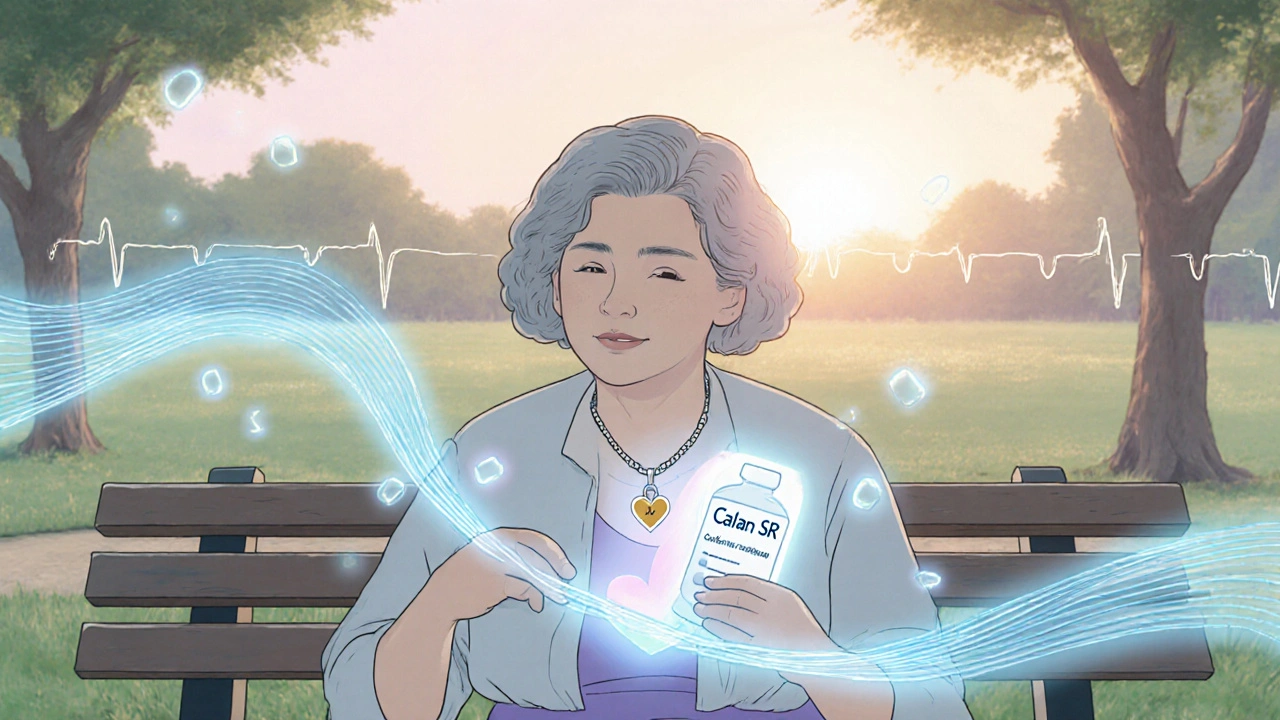What Is Calan and How Does It Work for Heart Conditions?

Calan isn’t a brand you hear every day, but if you or someone you know has been prescribed it, you know it’s not something to ignore. Calan is the brand name for verapamil, a medicine used to treat high blood pressure, chest pain (angina), and certain irregular heartbeats. It’s been around since the 1970s, and while newer drugs have come onto the market, Calan still holds a solid place in heart care-especially for people who need steady, long-term control.
How Calan Works in Your Body
Calan belongs to a class of drugs called calcium channel blockers. That sounds technical, but here’s what it really means: your heart and blood vessels rely on calcium to contract and relax. Too much calcium flowing into heart muscle cells and artery walls can make your heart work too hard and your arteries tighten up. Calan blocks some of that calcium, which helps your blood vessels relax and your heart beat more slowly and smoothly.
This leads to three main benefits:
- Blood pressure drops because arteries widen
- Chest pain lessens because the heart doesn’t need as much oxygen
- Irregular heart rhythms slow down or stabilize
Unlike some blood pressure meds that make you pee more or cause a dry cough, Calan works quietly in the background. You won’t feel it working, but your doctor will see the results in your readings and ECGs.
Who Gets Prescribed Calan?
Calan isn’t for everyone, but it’s often chosen for specific cases:
- People with chronic high blood pressure who haven’t responded well to other drugs like ACE inhibitors or diuretics
- Patients with stable angina-chest pain that comes on during stress or physical activity
- Those with atrial fibrillation or other supraventricular arrhythmias, where the upper chambers of the heart beat too fast or irregularly
- Older adults, because it tends to have fewer side effects than beta-blockers in this group
It’s also sometimes used off-label for migraines or anxiety-related palpitations, but those uses are less common and always require close monitoring.
Dosage and How to Take It
Calan comes in two main forms: immediate-release tablets and extended-release capsules (Calan SR). The immediate version is usually taken three or four times a day. The extended-release version is taken once or twice daily, which makes it easier to stick with.
Typical starting doses:
- For high blood pressure: 80 mg three times daily (immediate) or 120 mg once daily (SR)
- For angina: 120-240 mg daily in divided doses
- For arrhythmias: 80-120 mg three times daily
Your doctor will adjust the dose based on your response and how your kidneys and liver are handling it. Never change your dose on your own. Too much can cause your heart rate to drop dangerously low.
Side Effects You Should Know
Most people tolerate Calan well, but side effects happen. The most common ones include:
- Constipation (this is surprisingly common-up to 1 in 5 users)
- Dizziness or lightheadedness, especially when standing up
- Swelling in the ankles or feet
- Fatigue or feeling unusually tired
- Nausea or mild stomach upset
Less common but serious side effects include:
- Heart rate below 50 beats per minute
- Fainting or near-fainting episodes
- Shortness of breath or worsening heart failure symptoms
- Yellowing of the skin or eyes (sign of liver problems)
If you notice any of these serious signs, contact your doctor immediately. Don’t wait until your next appointment.
What You Should Avoid While Taking Calan
Calan doesn’t play well with a few things. Here’s what to watch out for:
- Grapefruit juice-it interferes with how your body breaks down verapamil and can cause dangerous spikes in drug levels
- Alcohol-it can make dizziness and low blood pressure worse
- Other heart meds like beta-blockers (e.g., metoprolol) or digoxin-combining them can slow your heart too much
- Some antibiotics like clarithromycin or erythromycin-they can increase verapamil levels
- St. John’s Wort-this herbal supplement can make Calan less effective
Always tell your pharmacist and doctor about every supplement, herb, or over-the-counter medicine you’re taking-even if you think it’s harmless.

Who Shouldn’t Take Calan?
Calan isn’t safe for everyone. Avoid it if you have:
- Severe heart failure (especially with low blood pressure)
- Second- or third-degree heart block without a pacemaker
- Very low blood pressure (systolic under 90 mmHg)
- A history of allergic reaction to verapamil or similar drugs
- Certain types of irregular heart rhythms, like Wolff-Parkinson-White syndrome, unless closely monitored
Pregnant women should only use Calan if the benefits clearly outweigh the risks. It passes into breast milk, so nursing mothers need to talk to their doctor before starting it.
How Long Does It Take to Work?
Calan doesn’t act like a quick fix. For blood pressure, you might see small changes in a week, but it often takes 2-4 weeks to reach its full effect. For chest pain, some people feel relief within days. For heart rhythm control, it can take longer-sometimes weeks-to stabilize.
Don’t stop taking it just because you feel fine. High blood pressure and arrhythmias don’t always cause symptoms, but they’re still doing damage if left unchecked.
Alternatives to Calan
If Calan doesn’t work for you-or if side effects are too much-there are other options:
| Medication | Class | Best For | Common Side Effects |
|---|---|---|---|
| Calan (verapamil) | Calcium channel blocker | High blood pressure, angina, SVT | Constipation, dizziness, swelling |
| Amlodipine | Calcium channel blocker | High blood pressure, especially in older adults | Swelling in legs, flushing |
| Metoprolol | Beta-blocker | Heart rhythm, post-heart attack, high blood pressure | Fatigue, cold hands, slow heart rate |
| Diltiazem | Calcium channel blocker | Angina, arrhythmias | Dizziness, headache, nausea |
| Lisinopril | ACE inhibitor | High blood pressure, heart failure | Dry cough, high potassium |
Some people switch from Calan to amlodipine because it causes less constipation. Others switch to diltiazem if they need stronger rhythm control. Your doctor will pick based on your full medical history-not just your blood pressure number.
Monitoring Your Progress
If you’re on Calan, expect regular check-ins. Your doctor will likely check:
- Your blood pressure weekly at first, then monthly
- Your heart rate (you might be asked to check it at home)
- Electrolytes like potassium and magnesium
- Liver and kidney function (via blood tests every 3-6 months)
Some people use wearable heart monitors (like an Apple Watch or KardiaMobile) to track their rhythm at home. That data can be super helpful for your doctor to see if Calan is working as it should.

What Happens If You Miss a Dose?
If you forget a dose, take it as soon as you remember-unless it’s almost time for your next one. Never double up. Missing doses can cause your blood pressure to spike or your heart rhythm to go haywire.
Set phone reminders. Use a pill organizer. Keep extra pills in your bag or car if you’re often on the go. Consistency matters more than you think.
Long-Term Use and Safety
Calan is safe for long-term use. Many people take it for years without problems. The biggest risk isn’t the drug itself-it’s not monitoring your health while you’re on it.
Studies tracking patients for over 10 years show that verapamil reduces the risk of stroke and heart attack in people with high blood pressure, especially when combined with lifestyle changes like walking daily, cutting back on salt, and managing stress.
It doesn’t cause weight gain or diabetes, unlike some other blood pressure meds. That’s a big plus for people already managing metabolic health.
Real-Life Example
Meet Maria, 68, from Perth. She was diagnosed with atrial fibrillation after feeling her heart flutter during yoga. Her doctor tried metoprolol first, but it made her too tired. Switching to Calan SR 120 mg once daily stabilized her rhythm within three weeks. She still feels a few skipped beats sometimes, but they’re not dangerous. Her biggest complaint? Constipation. She now eats more prunes, drinks more water, and walks every morning. Her blood pressure is 128/78. Her heart rate averages 62. She’s been on Calan for five years.
Her story isn’t unusual. Calan isn’t flashy, but it’s reliable.
Final Thoughts
Calan isn’t the newest drug on the shelf, but it’s still one of the most trusted for heart rhythm and blood pressure control. It works quietly, lasts long, and doesn’t mess with your metabolism. The trade-offs? Constipation and the need for careful monitoring. But for many, those are small prices to pay for a stable heart and fewer hospital visits.
If you’re on Calan, keep taking it. Talk to your doctor about side effects. Don’t let fear stop you from getting the care you need. And if you’re just starting out? Ask questions. Know why you’re taking it. Track your symptoms. Your heart will thank you.
Is Calan the same as verapamil?
Yes. Calan is the brand name for the generic drug verapamil. They contain the same active ingredient and work the same way. Generic verapamil is usually cheaper and just as effective. Your doctor may prescribe the generic unless there’s a specific reason to use the brand.
Can Calan cause weight gain?
No, Calan doesn’t typically cause weight gain. Unlike some beta-blockers or thiazide diuretics, it doesn’t affect metabolism or fluid retention in a way that leads to noticeable weight increase. Any weight gain while on Calan is more likely due to other factors like diet, activity level, or fluid retention from other causes.
Does Calan affect kidney function?
Calan is mostly processed by the liver, not the kidneys, so it’s often safer for people with mild kidney disease than some other heart medications. However, if kidney function is severely reduced, your doctor may lower your dose. Regular blood tests help monitor this.
Can I drink alcohol while taking Calan?
It’s best to avoid alcohol or limit it to very small amounts. Alcohol can lower your blood pressure even more than Calan already does, which can lead to dizziness, fainting, or falls. It can also make side effects like drowsiness or lightheadedness worse.
How long do I need to take Calan?
For chronic conditions like high blood pressure or atrial fibrillation, Calan is usually taken long-term-often for life. Stopping suddenly can cause rebound high blood pressure or worsening heart rhythm. Only stop if your doctor tells you to, and even then, it’s usually done gradually.
Can Calan be taken with statins?
Yes, Calan can generally be taken with statins like atorvastatin or rosuvastatin. But there’s a small risk that verapamil can increase statin levels in the blood, raising the chance of muscle side effects. Your doctor may choose a lower statin dose or pick a statin that’s less affected, like pravastatin.
What should I do if I feel dizzy on Calan?
Stand up slowly from sitting or lying down. Drink plenty of water. Avoid hot showers or saunas. If dizziness is frequent or causes you to faint, contact your doctor. You may need a dose adjustment or a check for other causes like low blood sugar or dehydration.

Premanka Goswami
November 19, 2025 AT 15:46Calan? Yeah, right. They say it's for blood pressure, but I've seen the patents. The same labs that made this also designed the microchips they implant in vaccines. You think your heart's just 'stabilizing'? Nah. They're syncing your pulse to the grid. You're not getting better-you're being tuned. And don't even get me started on the grapefruit juice thing. That's not a drug interaction-it's a frequency blocker. They don't want you to break the signal.
Alexis Paredes Gallego
November 21, 2025 AT 03:38Oh wow, another pharmaceutical love letter. Let me guess-next they’ll tell us aspirin was invented by aliens to keep us docile. Calan causes constipation? Shocking. Like, who knew blocking calcium would slow down your colon? Next they’ll say water is just government-controlled hydration. This post reads like a Pfizer ad written by a guy who thinks ‘angina’ is a new TikTok dance.
Saket Sharma
November 22, 2025 AT 07:04Verapamil is a Class IV antiarrhythmic. Calcium channel blockade reduces AV nodal conduction. Constipation is predictable due to smooth muscle inhibition in the GI tract. Grapefruit inhibits CYP3A4-major drug interaction. Don’t ignore the black box warnings. This isn’t wellness content-it’s pharmacology 101.
Bruce Bain
November 23, 2025 AT 12:51I had a cousin on this stuff. Said it helped his heartbeat but he felt like a zombie. Started eating prunes like a man possessed. Now he walks 5 miles every morning. Says he feels more alive than he has in years. Sometimes the simple stuff works best.
Jonathan Gabriel
November 24, 2025 AT 07:25Wait… so verapamil’s not just for heart stuff? I thought it was just a fancy blood pressure pill. But now I’m reading it’s used for migraines? And anxiety? So… is my brain just a little electrical circuit that gets glitchy? And we’re just… patching it with calcium blockers? Like… what if we just… stopped being so anxious? Would my heart fix itself? Or is this just… chemical surrender?
Don Angel
November 25, 2025 AT 07:23I’ve been on Calan SR for 3 years. It’s been a game-changer. My BP went from 160/100 to 128/78. I still get a little dizzy sometimes, especially in the morning. I drink water. I move slow. I don’t drink grapefruit juice-ever. I also take a magnesium supplement. It helps with the constipation. Honestly? It’s not glamorous. But it works. And I’m alive.
deepak kumar
November 26, 2025 AT 03:28My uncle in Delhi has been on verapamil since 2010. He’s 82. Still drives. Still gardens. He says the only thing he misses is his morning chai-he can’t have it with grapefruit anymore. He eats papaya instead. Says it’s better for digestion. He’s proof this stuff works if you’re consistent. Don’t overthink it. Just take it. And drink water.
Dave Pritchard
November 27, 2025 AT 07:29If you're new to this medication, don't panic. Side effects are real, but manageable. Constipation? Add fiber. Dizziness? Rise slowly. Talk to your doctor. Don't stop cold turkey. This isn't a sprint-it's a marathon. You're not broken. You're just learning how to care for your body differently. And that's okay.
Angela J
November 27, 2025 AT 14:01I just found out my neighbor is on this. She looked so pale last week. I asked if she was okay. She said, ‘I’m fine, just taking my heart pills.’ But then she whispered… ‘They told me not to tell anyone.’ Like… why? Is this some secret society thing? Are they watching us through our pacemakers? I think I need to move. Or maybe just start wearing aluminum foil underwear.
Sameer Tawde
November 28, 2025 AT 14:42Calan isn’t magic. But it’s medicine. And medicine isn’t supposed to be exciting. It’s supposed to keep you alive. If you’re on it, you’re doing something right. Keep moving. Keep eating. Keep showing up. Your heart doesn’t need a hero. It just needs consistency.
Erica Lundy
November 30, 2025 AT 12:56One is compelled to reflect upon the epistemological implications of pharmacological intervention in the context of somatic autonomy. The administration of verapamil, while ostensibly therapeutic, constitutes a form of biopolitical governance-where the body is rendered legible through the metrics of blood pressure and ECG rhythm. One must ask: Are we healing, or are we being calibrated? The silence of the drug's mechanism-its unfeeling efficacy-mirrors the silence of the medical-industrial complex itself.
Kevin Jones
December 1, 2025 AT 00:10Verapamil. Calcium channel blocker. Heart rhythm control. Constipation. Grapefruit. The trifecta of modern cardiology. You take it. You suffer. You adapt. You become a walking pharmacology textbook. And still, you live. That’s the real miracle-not the drug. It’s the human will to keep breathing, even when your body’s got a glitch.
Shravan Jain
December 2, 2025 AT 06:58Let’s be honest: this post is just a glorified drug pamphlet. Who wrote this? A rep? A nurse? A bot? Calan SR? More like Calan Scam. Why is there no mention of the 2018 FDA warning about verapamil and sudden cardiac death in patients with HCM? Oh right-because it’s not in the marketing deck. The truth is buried under bullet points and cherry-picked stats.
Brandon Lowi
December 2, 2025 AT 22:30Calan? That’s a YANKEE drug. Back in my day, we fixed hearts with garlic, holy water, and a good punch to the chest. Now? We give people pills that make them constipated and scared of grapefruit. America’s turned medicine into a corporate hymn. And you’re all singing along like good little drones. Wake up. Your heart isn’t broken-it’s been sold.